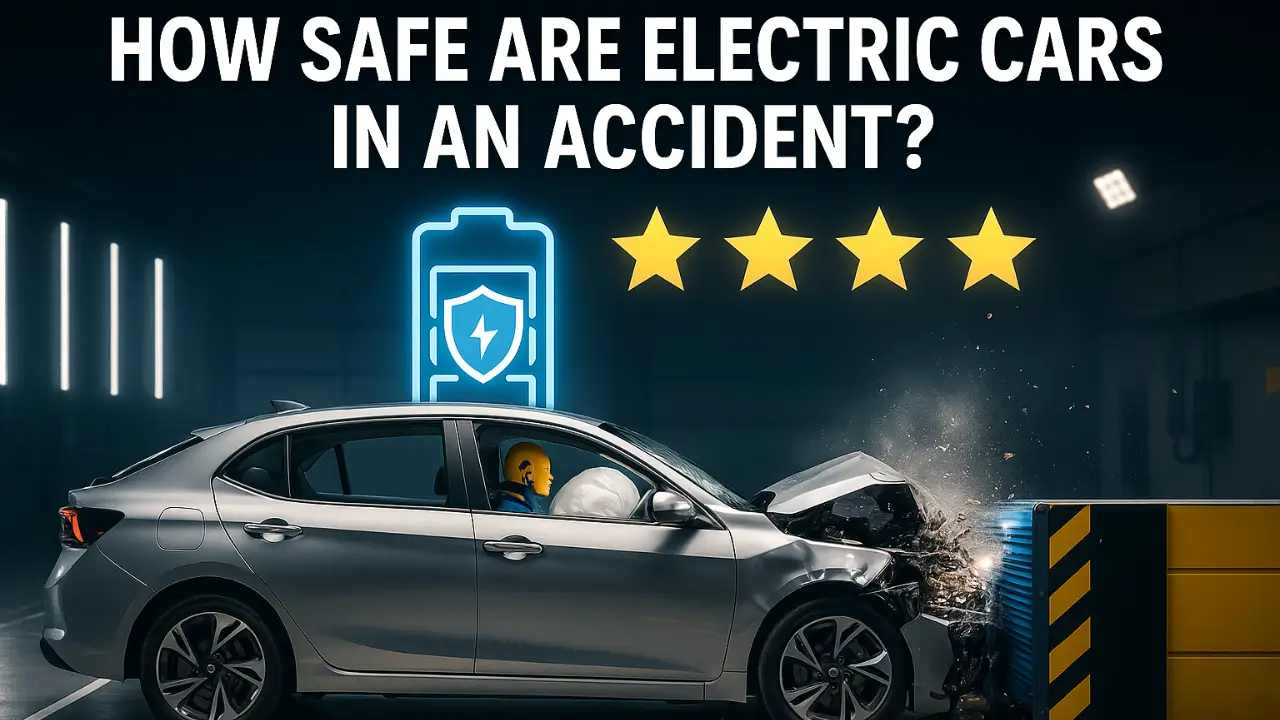Learn how safe electric cars are in an accident, with insights on battery protection, crash safety ratings, and advanced safety features.
Introduction
With electric vehicles not only making headlines but also flooding the nations roadways consumers are left asking an important question how safe are electric cars in a crash? Although EVs provide a cleaner quieter ride issues relating to battery fires, crash worthiness and body structural design remain. The good news? Electric cars are not only safe they are safer in many respects than conventional cars. This is due to advanced construction and rigorous safety testing.
Crash Safety Ratings: EVs Perform Well
Among the most straightforward aspects of a vehicle to quantify is how safe it is by referencing crash. That test results are provided by the likes of NHTSA and IIHS. Several of the best selling EVs including the Tesla Model 3, Hyundai Ioniq 5, Rivian R1T and Ford Mustang Mach-E have maintained strong crash test scores.
Advantages of Electric Vehicles
This is in no small part due to a few design advantages enjoyed by electric vehicles:
Low Center of Gravity: EVs normally store their large battery packs in the floor of the car. This not only lowers the center of gravity but also makes rollovers less of a concern. This is a major safety issue in traditional SUVs and trucks.
No Engine Block: With no big old engine block in the front there are bigger crumple zones. These are better equipped to dissipate the impact before it reaches you in a head-on crash.
Sturdy Battery Design: A battery pack that is frequently surrounded by a solid casing providing the frame with additional strength especially in the event of a side crash.
Fire Risk: Fact vs Perception
A lot of the fear around the safety of electric vehicles can be traced back to one repeatedly chronicled form of fire those in lithium ion batteries. It is a fact that lithium ion batteries can catch fire when they are subjected to extreme stress. It happens if they experience a severe crash or are punctured. But let’s put this in perspective.
The statistics show that EVs are not any more at risk of fire than gasoline cars. According to some reports in fact they may be less likely to catch fire. According to a 2023 AutoinsuranceEZ report per 100,000 vehicles sold EVs had about 25 fires while internal combustion engine vehicles had 1,530 fires.
Fires caused by batteries are less common, but can be more fierce and difficult to put out as a result of thermal runaway. Because of this car companies have implemented several safety innovations, such as:
- Cooling thermal battery management systems.
- Protected battery casings designed to resist impact and intrusion.
- Crash-sensing cut-off systems which cut off power to the battery in the event of a crash.
Post Crash Attentions: Recuing and Recovery
Emergency personnel have had to adjust to the proliferation of EVs on roadways. Evacuating gasoline tanks in gasoline engines cars is more straightforward. But in EVs there are specific methods that must be followed to safely recover a crashed vehicle. For example accidentally cutting into the wrong area of a vehicle could put responders in the path of high-voltage systems.
Automobile manufacturers have responded to this by supplying emergency response guides and incorporating not to cut into sections of the vehicle and high voltage components within the vehicle body design. Electric vehicles also have sensors that shut off the high voltage battery system in the event of a significant crash.
- Audi GT50 Concept: A Loud Reminder of Why Car Enthusiasts Fell in Love With Audi
- Nearly 30% of UK Drivers Believe Car Tax Should Be Based on Mileage — Survey
- Why Planes and Boats Escaped the Luxury Tax But Cars Didn’t
- Australia’s Headlight Confusion: Authorities Warn Drivers After Viral $250 Headlight Rule Goes Wild Online
- 2025 Hyundai Venue Facelift Launched in India – Full Details, Variants, and Price
Pedestrian Safety: Quieter Is Not Always Safer
There is one area where electric vehicles are especially problematic pedestrian safety. Because they are so much quieter than conventional vehicles particularly at lower speeds E.V.s can be more difficult for pedestrians and bicyclists to hear. To address this both the US and EU now mandate that electric vehicles create fake noise at speeds of up to 30 km/h.
Final Thought
The answer is a clear yes electric vehicles at least as safe in crashes and often safer than their gasoline powered counterparts in many major safety categories. Thanks to their design the vehicle has outstanding crash insulation and low rollover risk and is very structurally safe. Battery fires are rare and increasingly unlikely as battery technology improves.
The driver road and vehicle maintenance are ultimately responsible for safety as with any vehicle. But if your concern is whether you’ll be more vulnerable in an EV during an accident the data, engineering and real world performance suggest you can breathe easy.
